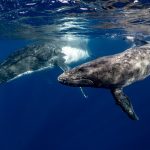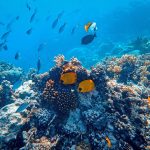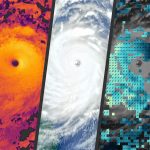 March 8, 2021 1:54 pm
Published by Climate Extremes
March 8, 2021 1:54 pm
Published by Climate Extremes
As part of the Future Seas project, this paper summarizes knowledge and perspectives on ocean literacy from a range of disciplines, including but not exclusive to marine biology, socio-ecology, philosophy, technology, psychology, oceanography and human health.
 March 5, 2021 1:19 pm
Published by Climate Extremes
March 5, 2021 1:19 pm
Published by Climate Extremes
CLEX researchers found coastal marine heatwave hotspots were concentrated along the Mediterranean Sea, Japan Sea, south‐eastern Australia and the north‐eastern coast of the United States. They also found the frequency of these events and their duration globally increased by 1–2 events per decade and 5–20 days per decade. Most of the marine heatwave hotspots identified were associated with high upward trends.
 March 5, 2021 11:19 am
Published by Climate Extremes
March 5, 2021 11:19 am
Published by Climate Extremes
The most intense and destructive tropical cyclones generally go through a period of rapid intensification, where "rapid" means that the near-surface winds increase by more than 15 m/s (54km/hr) in 24 hrs. However, the physical processes by which storms rapidly intensify are not well understood. This study uses very high-resolution simulations with the UK Met Office Unified Model of the 2016 north-Pacific tropical cyclone, Nepartak, to explore the processes responsible for its rapid intensification.
 March 3, 2021 3:45 pm
Published by Climate Extremes
March 3, 2021 3:45 pm
Published by Climate Extremes
The largest rivers on Earth are not on the ground, but in the sky. Our new study, published in Environmental Research Letters, showed that nine out of ten of the most expensive floods in New Zealand (2007-2017) occurred during an Atmospheric River event, and seven to all ten of the top ten most extreme rainfall events at eleven different locations occurred during Atmospheric Rivers.
 March 1, 2021 11:57 am
Published by Climate Extremes
March 1, 2021 11:57 am
Published by Climate Extremes
Mi nombre es Denisse Fierro Arcos, soy bióloga marina nacida en Ecuador, pero que adopté a Australia como mi segundo país hace unos años. He trabajado como consultora ambiental e investigadora y he tenido la oportunidad de trabajar en proyectos que se enfocan en una variedad de sistemas y especies marinas en Sudamérica y Australia.
 March 1, 2021 11:53 am
Published by Climate Extremes
March 1, 2021 11:53 am
Published by Climate Extremes
Denisse Fierro Arcos is back in Australia completing her first semester as a PhD student at the University of Tasmania’s Institute for Marine and Antarctic Studies (IMAS). Her project focuses on understanding how fine scale changes in sea ice and ocean conditions affect Southern Ocean marine ecosystems. This is her first blog post.
 February 26, 2021 11:50 am
Published by Climate Extremes
February 26, 2021 11:50 am
Published by Climate Extremes
This time last year Kim Reid was planning a Euro-adventure where she would attend a summer school in the Swiss Alps, attend EGU, visit Reading and the Met Office and explore some castles on the side. Now she and her supervisor joke that if case numbers stay low, Kim might be able to visit a university in the same city.
 February 15, 2021 1:22 pm
Published by Climate Extremes
February 15, 2021 1:22 pm
Published by Climate Extremes
There is a great deal of misuse of climate model projections emerging in business. Climate models are being used for some purposes that are simply inappropriate leading to assessments of the physical risks to business that are of no value. However, there are ways to use climate model data that has value and can help business robustly assess some specific climate related risks.
 February 15, 2021 11:37 am
Published by Climate Extremes
February 15, 2021 11:37 am
Published by Climate Extremes
The ARC Centre of Excellence for Climate Extremes (CLEX) invites applications from talented Graphic Designers to join their team. The Graphic Designer will be producing graphics and visual aids to assist in communicating the centre's research to the public, schools, businesses and government.
 February 12, 2021 2:05 pm
Published by Climate Extremes
February 12, 2021 2:05 pm
Published by Climate Extremes
In this study, the researchers propose a reporting format for leaf-level gas exchange data and metadata to provide guidance to data contributors on how to store data in repositories to maximise their discoverability, facilitate their efficient reuse, and add value to individual datasets.









